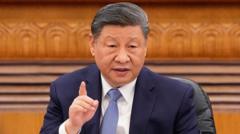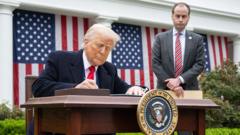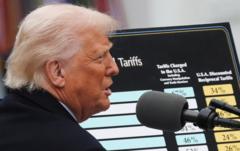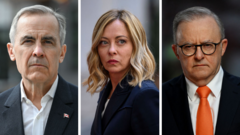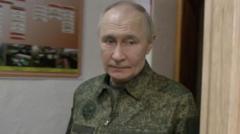Tensions escalate as Trump criticizes Zelensky while European leaders defend the Ukrainian president's status.
Trump Labels Zelensky a 'Dictator' Amid Escalating Tensions
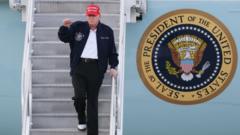
Trump Labels Zelensky a 'Dictator' Amid Escalating Tensions
Former President Trump confronts Ukraine's leader, citing disinformation and leadership failures.
In a recent social media post, former President Donald Trump has ignited a firestorm of controversy by labeling Ukraine's President Volodymyr Zelensky a "dictator," asserting he has failed in his leadership amid the ongoing conflict with Russia. The comments emerged following Zelensky's critical remarks about the United States' handling of peace talks with Russia, during which Ukraine was notably excluded. Trump's provocative statement suggested that "Zelensky better move fast or he is not going to have a country left," prompting swift backlash from several European officials.
German Chancellor Olaf Scholz quickly responded to Trump's remarks, describing them as "wrong and dangerous," while German Foreign Minister Annalena Baerbock stressed the absurdity of calling Zelensky a dictator "when you look at the real world." Swedish Prime Minister Ulf Kristersson and UK opposition leader Kemi Badenoch echoed these concerns, underscoring the democratic legitimacy of Zelensky's presidency, which faces unique challenges due to martial law amid the Russian invasion that began in February 2022.
The tension between the two leaders escalated with Trump's follow-up post on Truth Social where he expressed love for Ukraine but criticized Zelensky's handling of the country, alleging that millions have died unnecessarily. A White House spokesperson indicated that Trump's remarks were a direct response to Zelensky's earlier claims of disinformation and suggested that the former president's views were reflective of a desire for more effective negotiations ending the war.
Zelensky's administration rejected Trump’s narrative, underscoring that his presidency is legitimate, particularly in light of current martial law where elections are on hold. The contentious exchange traces back to Trump's news conference earlier in the week where he assigned blame for the ongoing war solely on Ukraine.
Amidst these back-and-forth statements, Zelensky reiterated the disinformation campaigns emanating from Russia and countered attempts by Trump to downplay Ukraine's situation by asserting that recent polls suggest strong trust in his leadership—refuting claims of a mere 4% approval rating.
While the rift continues, Russian President Vladimir Putin stated he would welcome meeting with Trump, as the EU announced additional sanctions targeting Russian entities. With the global focus squarely on the unfolding geopolitical situation, the implications of this exchange may ripple through international relations and peace negotiations in the region.
German Chancellor Olaf Scholz quickly responded to Trump's remarks, describing them as "wrong and dangerous," while German Foreign Minister Annalena Baerbock stressed the absurdity of calling Zelensky a dictator "when you look at the real world." Swedish Prime Minister Ulf Kristersson and UK opposition leader Kemi Badenoch echoed these concerns, underscoring the democratic legitimacy of Zelensky's presidency, which faces unique challenges due to martial law amid the Russian invasion that began in February 2022.
The tension between the two leaders escalated with Trump's follow-up post on Truth Social where he expressed love for Ukraine but criticized Zelensky's handling of the country, alleging that millions have died unnecessarily. A White House spokesperson indicated that Trump's remarks were a direct response to Zelensky's earlier claims of disinformation and suggested that the former president's views were reflective of a desire for more effective negotiations ending the war.
Zelensky's administration rejected Trump’s narrative, underscoring that his presidency is legitimate, particularly in light of current martial law where elections are on hold. The contentious exchange traces back to Trump's news conference earlier in the week where he assigned blame for the ongoing war solely on Ukraine.
Amidst these back-and-forth statements, Zelensky reiterated the disinformation campaigns emanating from Russia and countered attempts by Trump to downplay Ukraine's situation by asserting that recent polls suggest strong trust in his leadership—refuting claims of a mere 4% approval rating.
While the rift continues, Russian President Vladimir Putin stated he would welcome meeting with Trump, as the EU announced additional sanctions targeting Russian entities. With the global focus squarely on the unfolding geopolitical situation, the implications of this exchange may ripple through international relations and peace negotiations in the region.






